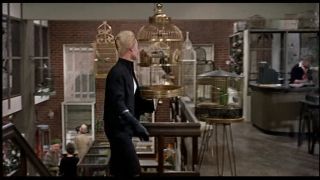The MacGuffin: News and Comment (18/Aug/2012)
(c) Ken Mogg (2012)
Aug 18
First, compare the frame-capture from The Birds above, showing the cluttered general-store in Bodega Bay, with the frame-capture below, from the start of the film, where Melanie (Tippi Hedren) arrives at Davidson's Pet Shop in San Francisco, which is much less cluttered - spacious in fact - and whose clientele appear to be typically well-to-do matrons, seeking animal companions. (There are many such lonely matrons in Hitchcock, such as Mrs Van Hopper in Rebecca and Mrs Stevens in To Catch a Thief, not to mention the 'merry widows' in Shadow of a Doubt. 'Loneliness' or its prospect may be the most basic of all Hitchcock themes, and permeates many of his films - not least The Birds.) Note also the pet shop's 'gilded cages' which are likened by the film to the very ego (e.g., Melanie's) that the dynamic of the film effectively challenges before the end. (Even the proprietor of the general-store has his 'cage', where he performs his Post Office duties.) Schoolteacher Annie Hayworth (Suzanne Pleshette) calls Bodega Bay 'our little hamlet ... a collection of shacks on a hillside', and Melanie is forthright when she initially says that she 'despises' it. But she will learn to weep for humanity before the end, and to recognise that all creatures are bound in their shared creature-liness (what the philosopher Schopenhauer called Will). Marnie will have a similar theme, and Marnie in the novel will articulate her lesson, learned through suffering, that there is only one loneliness, 'the loneliness of all the world'. But we were talking last time about the Absurdity on display in certain Hitchcock films such as The Birds. Clearly that Absurdity relates to what I've just said about loneliness. The sub-title of Ionesco's play 'Amédée, or How to Get Rid of It' (see last time) only ostensibly refers to the dead body in the Paris apartment, and has much more to do - mockingly and ironically - with the bourgeois mentality of Amédée and his wife that is being satirised. Likewise, the ever-increasing number of birds that turn on humans in The Birds are drawing attention to the perilousness of the human condition, its 'causes', and what is to be done to alleviate that condition. All this, in the form of a 'thriller' (but which Ionesco himself said was the form of all plays anyway - see last time). The Absurd tone is both sardonic (like Schopenhauer could be, when describing the way of the world) and designed to make comic and palatable the 'lesson' on display. And merely surrendering to clutter, or doing the opposite - shoring oneself up against it - will not solve the basic problem. (How often in Hitchcock a principal character's trajectory - say Scottie's in Vertigo - may be seen in retrospect to have been misguided and skewed from the outset.) I'm reminded of how the poet Keats advocated 'negative capability' (a wise passiveness) though he could also see the benefits (and not only to poets) of its opposite, the active pursuit of rational knowledge. So often, seemingly every avenue in human affairs has its opposite - equally valid or invalid - running nearby! One 'solution', frequently advocated, is to abide by the Golden Mean. But maybe it needs to be more 'intuitive' than just the 'compromise' between opposites that notion seems to imply. I like this description (in 'Encyclopaedia Britannica') of an aspect of Ionesco: 'There is something undeniably farcical in Ionesco's spectacles of human regimentation, of men and women at the mercy of things [e.g., 'Amédée', 'The Chairs' - see last time]; the comic quality here is one that Bergson would have appreciated.' But of course Bergson not only commented on the 'mechanical' basis of much comedy but showed, in a profound essay, influenced in all probabliity by such forerunners as Schopenhauer and Proust, on how 'intuition' might point the way and yield a superior knowledge. I have often suggested that such a concept is reflected in Hitchcock's philosophy of 'pure film' and the 'therapeutic' effects of a good thriller (e.g., The 39 Steps, North by Northwest, The Birds) on audiences, who are 'brought alive' by exposure to it. I'll apply this idea to The Birds next time. Meanwhile my thanks to DF, a linguist, who this week emailed me about the idea of opposites-running-together in a film like The Trouble With Harry and how, I had suggested, 'you disregard one or the other at your peril'. 'By gum, you've hit the nail squarely on the head ... as far as Hitchcock is concerned ... this seems to me the most important aspect of the [Hitchcock film's] content ... one might say [that this describes] Hitchcock's semantic level'. [Note. Our News section below will be updated shortly.]
This material is copyright of Ken Mogg and the Hitchcock Scholars/'MacGuffin' website (home page) and is archived with the permission of the copyright holder. |

